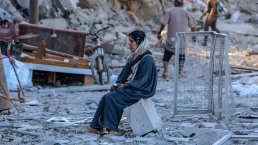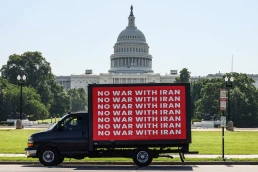Israel’s siege of the north and ‘benevolence’ toward gangs looting aid trucks has led to severe food shortages and skyrocketing prices across Gaza.
By Ruwaida Kamal Amer, +972 Magazine
Mustafa Al-Darsh, a 35-year-old father of three from Gaza City, spends hours every day searching for food for his family. Some days, he manages to secure a few canned goods; other days, his family has to settle for plain rice. “In the north, we yearn to eat bread with some thyme,” he told +972. He hasn’t been able to find flour for months.
Since the start of October, when the Israeli army encircled northern Gaza and began subjecting it to a campaign of expulsion and extermination, no goods — including humanitarian supplies — have entered the area. In early November, a UN panel warned that famine was imminent in the besieged area in the north of the Strip, where around 75,000 Palestinians were estimated to still remain. Local organizations have since urged the UN and international bodies to formally declare a famine. Now, with the UN Relief and Works Agency (UNRWA) forced to pause aid deliveries through the Kerem Shalom crossing in the south, hunger and malnutrition across the enclave are set to intensify.

As a father, Al-Darsh usually forgoes his own meals to ensure that his wife and children eat. “Our bodies are exhausted from the lack of food — we’re unable to do anything,” he explained. When night falls, he is usually too hungry to sleep. “Sometimes I feel that I will lose my mind because of what we are living through,” he added.
More often than not, Al-Darsh cannot find any food at all, and his children go without meals for several days at a time. “Every day, I cry because they miss food,” he said. “They constantly ask me about food, telling me what they want to eat.”
“In the north of the Strip, there is a real famine,” Adnan Abu Hasna, an UNRWA spokesman, told +972. “The situation is very dangerous: there is no food, potable water, or any supplies. All health facilities have collapsed, and there are dozens of bodies lying in the streets and under the rubble.” Without international pressure to surge aid into the Strip, Abu Hasna warned, “famine will spread in the north and south.”
But what Al-Darsh described as a “harsh war of starvation” only appears to be escalating by the day. “They treat us as people who do not deserve to live, with the continuous bombing, destruction, and starvation,” he lamented. “We want to die full, not hungry. This is all we hope for.”
Recent Posts
A War With Iran Would Not Be a One-Off Event But a Disastrous Ongoing Rupture
February 26, 2026
Take Action Now If Congress cedes its power to stop a war with Iran, it will fully erode any lingering promise of democratic restraint.By Hanieh…
New Addition to List of Nuclear Near Catastrophes
February 25, 2026
Take Action Now Debris flew for great distances — many times the distance of 270 meters to a nuclear reactor and nuclear storage facility.By David…
Gavin Newsom’s last budget belies his ‘California for All’ pledge
February 24, 2026
Take Action Now Yet, even as the state is poised to lose billions in federal funding, and millions of Californians are losing access to health care…
Israel and American Hawks are Pushing U.S. to Iran War With Catastrophic Consequences
February 23, 2026
Take Action Now At the World Health Assembly in May, member states may endorse an unprecedented strategy declaring that health is not a cost – but…




